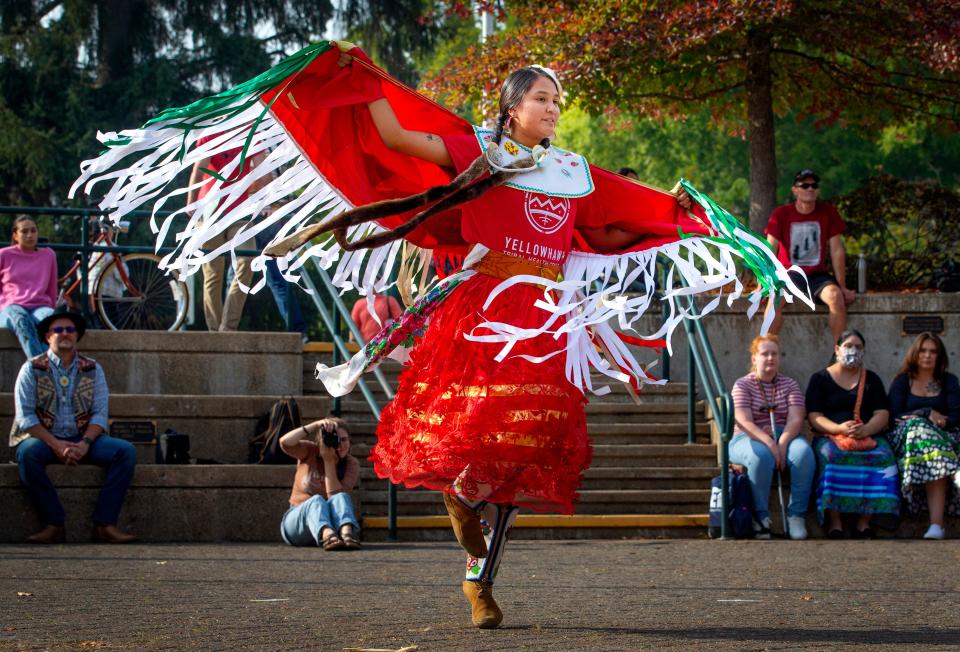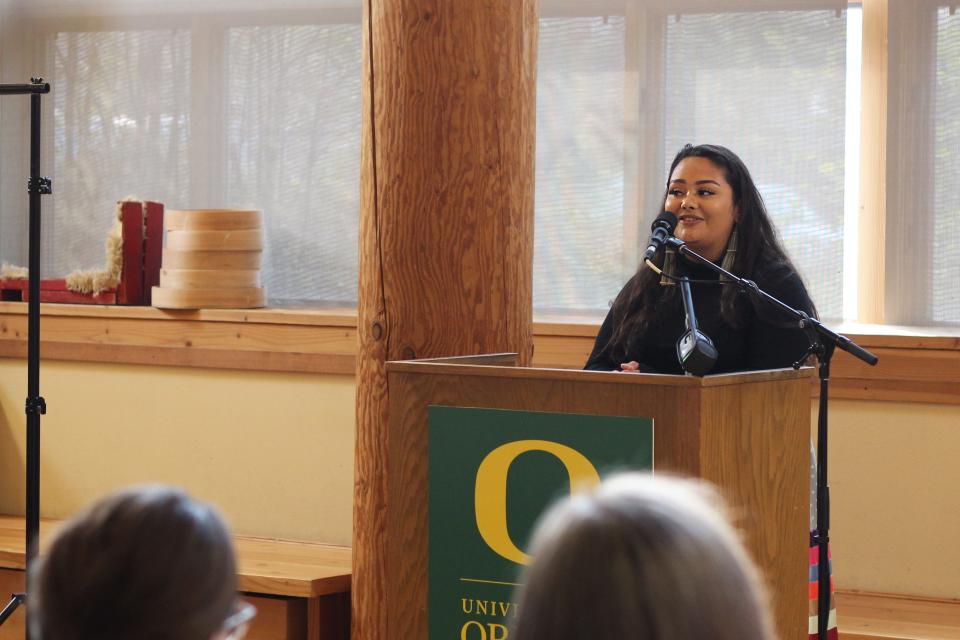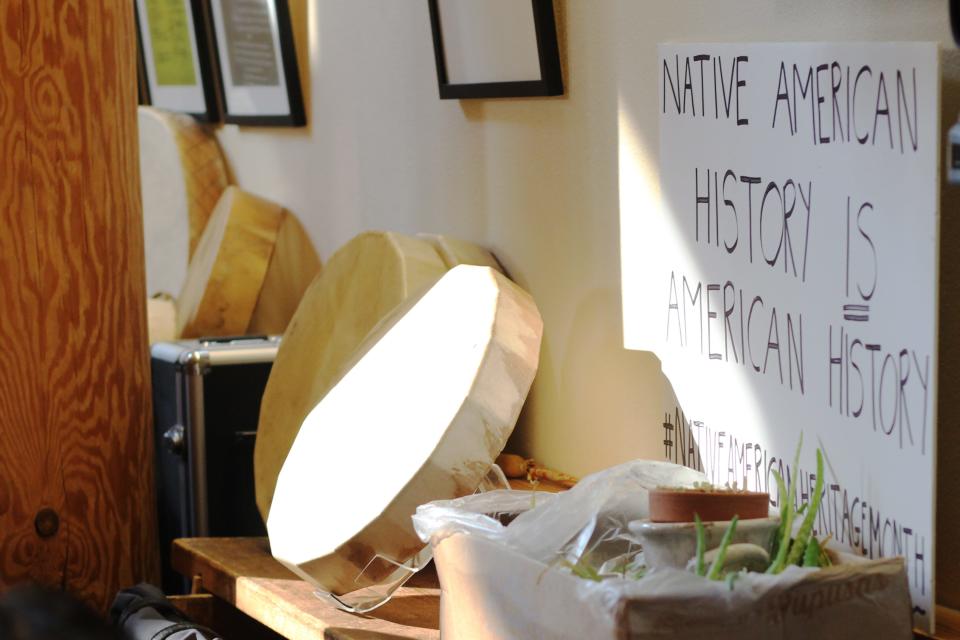Indigenous University of Oregon students receive full tuition coverage under new program
The University of Oregon announced Monday a new initiative to support Indigenous students that will cover all tuition costs and offer additional resources to Oregon's Native students.
The Home Flight Scholars Program is available immediately to currently enrolled eligible undergraduate students, an estimated 150 to 175 self-identified American Indian and Alaska Native Oregon residents. The program also will establish a new academic adviser position and offer professional development aimed at Indigenous students.
Native students have the highest college dropout rate of any other race or ethnicity due to financial hardships, academic difficulties and the lack of cultural connectedness, according to Kirby Brown, associate professor and director of the new Native American and Indigenous Studies Program.

Brown said the majority of Native students that leave drop out their first year, and 90% of those drop out in the first term.
The Home Flight Scholars Program is focused on changing this trend.
"We're very, very cognizant of who is on campus and why we are supporting them through their education, because it makes the difference in the future," said Jason Younker, assistant vice president and advisor to the president on sovereignty and government to government relations. "They are our future stewards, they will come back to the tribes and they will be UO allies, they will be our future leaders."
Younker, who is also chief of the Coquille Indian Tribe, said he knows the struggle of being a young Indigenous person starting out in college. He recalled his father dropping him off at university saying, "forget everything you know about being Native because it will do you no good here."
Younker dropped out in his second year.
The Home Flight Scholars program also offers early arrival to campus for Indigenous students, allowing time to get used to the campus three days before the rest of the student body moves in.
"If I had been able to come three days early and live in the dorms and scout out my classes and find Safeway and a coffee place, I think would have been a lot happier," Younker said. "I wouldn't have been so nervous when 25,000 other students came onto campus where I felt very, very lost. I didn't know how to navigate, and nobody looked like me."
Celebrating Indigenous Peoples' Day
The announcement of the Home Flight Scholars Program came on Indigenous Peoples' Day, which was appreciated by student Megan Van Pelt, a member of the Confederated Tribes of the Umatilla Indian Reservation and co-director of UO's Native American Student Union.
"Today is about the visibility and the celebrations of Indigenous people," Van Pelt, a junior at UO, said. "I'm going to call my friends and just be like, 'Hey, there's a new program out and it's gonna support you' because I know a lot of Native students who aren't supported by the Tribal Student Grant."
Van Pelt said the aspect of the program she's most looking forward to is the addition of an academic adviser position for Native students. Currently, Norma Trefren is the main adviser for Native students. Although the speakers at Monday's announcement agreed she does an amazing job, she can't do it all by herself.

Native students need added support. Many students come from reservations or communities that are vastly different from UO.
"I come from a community where everyone looks like me," Van Pelt said. "When I come to the different community where I am a minority, and I just don't feel as welcomed or as heard, I think that was another problematic issue going to PWI (predominantly white institution). There's so many components that go into being a Native student at University of Oregon, and many institutions: financial barriers, family commitments, your culture, identity, the list can go on and on."
She has since been able to connect with fellow Indigenous students, staff and faculty members at the university. But Van Pelt said she feels more welcomed as an Indigenous person because of the program.
She said she is looking forward to an increase in Native student enrollment that will hopefully come from the added support.
"I just feel so much better to come into this space where I can see fellow Natives even though we come from, like, different backgrounds or different areas," Van Pelt said. "It's just the sensitive community that makes me feel more grounded."
Van Pelt, other members of the Native American Student Union and other UO officials also gathered at the EMU on Monday afternoon to raise the flags of the nine federally recognized tribal nations in Oregon.
Younker said UO was the only university to do such a display of recognition.
Continued funding commitment
UO leaders are expecting the Home Flight Scholars Program to continue indefinitely, but it is not yet ensured. According to UO Interim President Patrick Phillips, the state must approve funding for the program yearly.
"Our program is predicated on the faith that the state will continue to step forward with their commitment to our Native students, and I anticipate that that will be true," Phillips said. "Every conversation I've had with the state Legislature, as well as the Higher Education Coordinating Commission, (I've heard) that this is the No. 1 funding priority."
The Home Flight Scholars also works in conjunction with the Oregon Tribal Student Grant, a grant that is intended to cover the average cost of attendance. However, the Oregon Tribal Student Grant only covers people enrolled in one of Oregon's nine federally recognized tribal nations. It does not cover tuition for people who live in Oregon that are enrolled in tribes outside of Oregon.
Similarly to UO, several Oregon universities have pushed out scholarships targeting undergraduate students enrolled in federally recognized tribes.
Eastern Oregon University has its First Citizen Award, providing funding to Native students who meet the scholarship criteria. Oregon State University, Portland State University, Southern Oregon University, Western Oregon University and Oregon Institute of Technology all offer in-state tuition to Native students, even those who live outside of Oregon.

"The bottom line is that all Native students who are Oregon residents and are registered citizens of federally recognized tribes will have their tuition fees covered either by the state of Oregon for the existing program, or directly by the University of Oregon," Phillips said. "This is hopefully a strong illustration of our commitment to this important community.
"I'm very honored actually to stand in this space on this day, Indigenous Peoples' Day, to be able to launch this program."
Miranda Cyr reports on education for The Register-Guard. You can contact her at mcyr@registerguard.com or find her on Twitter @mirandabcyr.
This article originally appeared on Register-Guard: Indigenous UO students get tuition coverage, resources in new program

